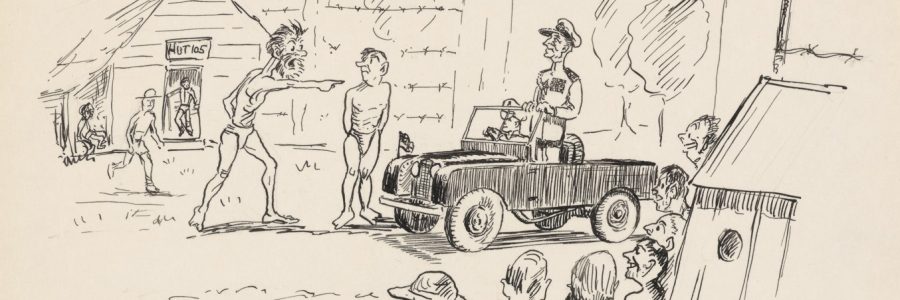
VJ Day, Singapore, 1945
15 August 2020 marks the 75th anniversary of the surrender of Japan and the conclusion of the Second World War. It is a time to reflect upon the immense destruction caused by the conflict in the Far East, and to remember the suffering and sacrifice on both sides. The Royal Commonwealth Society department at Cambridge University Library has unique sources shedding light upon the impact of the war upon Malaya’s British civilian population. These are archives of two internment camps at Singapore, Changi and Sime Road, where British and Allied civilians were imprisoned for three and a half years, between the fall of the city to the Japanese in Feb. 1942 and its liberation in Aug. 1945. One of the most evocative documents to survive is Sime Road’s final roll call, fittingly taken on 15 Aug. 1945 (left), which records that it contained 4,507 internees: 3,157 men, 1,023 women and 328 children, some of whom had been born in the camp. The names of these individuals, drawn from more than 20 countries, are recorded in the camp’s nominal rolls, and their extraordinary story of endurance and liberation can be reconstructed from the archives.
One of the most moving accounts of how news of victory reached Sime Road’s isolated and exhausted internees and of the celebrations which greeted liberation of the camp and Singapore was written by William Churchill, a veteran of the Malayan Civil Service. Churchill and a friend ignored warnings against travelling before the arrival of the victorious troops, and hitched a ride with a truck full of Chinese workers to the city’s quay to witness the historic event. Memories of traumatic defeat mingled with the joy of the present:
‘Morning hot and sunny but there is now no smoke and no smell of burning in the air. No soldiers lay sprawled in utter exhaustion on the steps of buildings and on the pavements. There are no lines of derelict and deserted cars. Not very many people about yet but up against the sea wall a crowd of Asians, chiefly Chinese, is gathering looking eastwards at a most heartening sight. In the immediate foreground are two huge flying boats and beyond ships of war, the most conspicuous being HMS Nelson. There are transports and hospital ships.
It was inevitable that my mind went back to that former and terrible afternoon of the 14th February, 1942. Not yet was I wildly happy. I was stunned and I kept on thinking ‘Is it really over? Are we doing all we can to celebrate this?’ However, the sight of the ships was beginning to make me exalt and my spirits began very gently to soar…’
Churchill’s memoir eloquently expresses the very complex, mixed emotions experienced during liberation and the final days of internment. A sense of frustration and impatience among some internees, who felt they had been abandoned, inspired a notable outburst during Admiral Louis Mountbatten’s visit to camp, brilliantly illustrated by fellow internee Robert Harper,
‘I missed the arrival of Lord Mountbatten standing erect in his splendid Admiral’s uniform -white for the tropics of course – entirely dominating the jeep in which he rode. Within a very short space of time the story flashed around, which I know is true, that an exceedingly wild looking internee advanced to the jeep and shouted “where the hell have you been all this time?”’
Churchill’s memoir and the rest of the compelling internment camp archives have been digitised with the generous support of the Wellcome Trust and are freely available on Cambridge Digital Library.
We are delighted to mark VJ Day with the release of transcriptions of one of the collection’s great highlights, the newspapers produced in the men’s camps. They recorded events and information related to every aspect of their daily management. The newspapers published fiction, poetry and humour, and also reported on the activities of sporting, theatrical, musical and educational societies, which played such a vital role in maintaining camp morale. Searching the transcriptions will help to unlock the newspapers’ research potential and allow the easy identification of individuals. To make this possible, we are extremely grateful to RCS volunteer Tony Truett, who has generously devoted his time and knowledge of the internment camps, and to our CDL colleague, Huw Jones, for this thought and technical expertise.
While a substantial portion of the newspapers are now searchable, the transcriptions are a work in progress and more will be added over the coming months. To find the transcriptions, please select the ‘View more options’ tab, and then select ‘transcription diplomatic’.

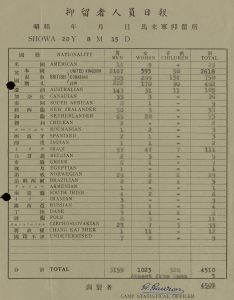
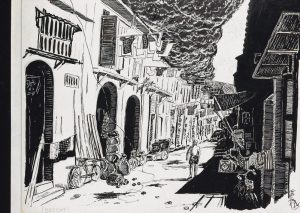
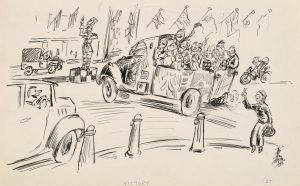
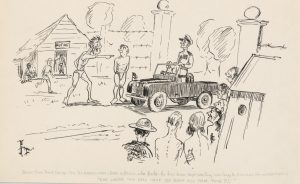
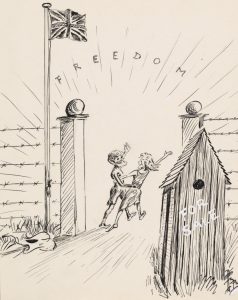
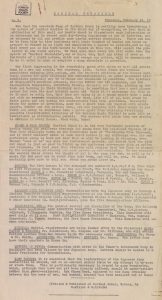
Sad you seem to have nothing on the Civilian women internees –
Gladys Minnie Davies (nee Kemp) and Aubrey VL Davies Barrister
I am Looking to see what they went through. My great Aunt survived, never spoke of her ordeal ( I was to young) and family never did – only a few photos are left.. Her husband a top Singapore based Barrister when captured took ill and died in hospital within three months of early senility.
and recently purchased a young girls diary in Changi prison with a list of all who contributed to the British and Australian Quilts.
Dear Margaret,
There is some material at the Imperial War Museum relating to women internees, including their newspaper ‘Weekly Pow Wow’, https://www.iwm.org.uk/collections/item/object/1030024185 You have acquired a fascinating diary.
John